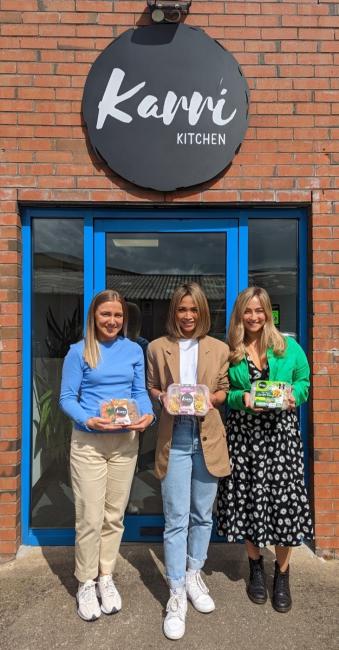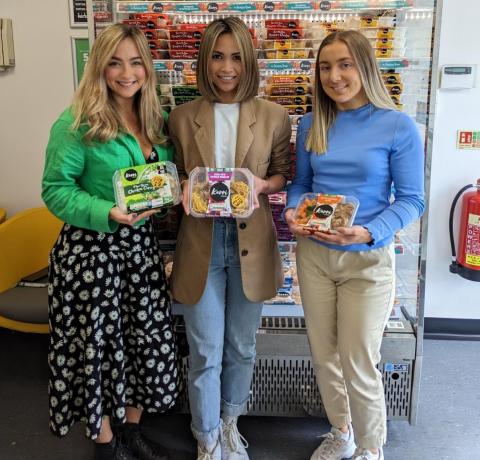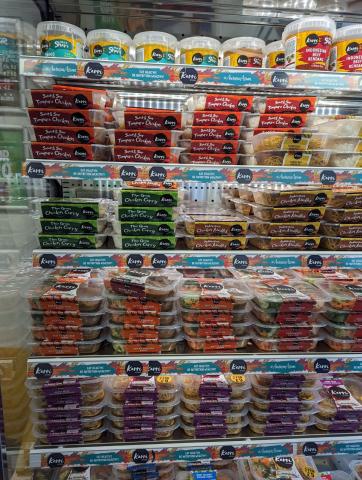Case study: Karri Kitchen
This case study demonstrates how funding and technical support helped Karri Kitchen achieve success in healthier ready meals.
A full list of funding and technical support is available on our Resource to support businesses with reformulation page.
Karri Kitchen is a healthier ready meals success story. Shera McAloran runs the Northern Ireland-based food business, producing a range of healthier, south-east Asian-inspired ready meals at her premises in Portadown. Having gone from strength-to-strength, she now employs 20 people and won the FSA-sponsored Healthier Product Innovation Award at the Northern Ireland Food and Drink (NIFDA) awards in 2022.
The Dietary Health team from the FSA in Northern Ireland have heard first-hand from Shera how businesses can be helped financially and technically to offer healthier alternatives to the everyday products they produce, sell and serve.
"I love cooking and I am in love with the local produce in Northern Ireland.”

From left to right: Katie McFarland (FSA), Shera McAloran (Karri Kitchen), Freya Sharpe (FSA) Credit: Freya Sharpe
Shera moved from Australia to Portadown in 2017. Her food business began in a small way, making food for friends at home, inspired by her south-east Asian culinary heritage. Looking to expand, Shera realised there was a gap in the market when she couldn’t find any healthier ready-meal options herself:
“There are a few in the Belfast area but there is very limited choice. I could see there was a gap in the market, and I just love cooking and the local produce in Northern Ireland. So, I thought I would try to introduce some south-east Asian recipes into the area.”
Shera says getting the right balance between taste and nutrition was the biggest challenge when developing her products:
“I like to make my meals low in fat or calories but also high in protein. I aim for green lights, sometimes amber at most, on the traffic light system. We try as much as possible not to get reds.” And trying to get that balance isn’t easy. “We try lots of different things, like substituting a recipe component for a healthier option.”
“It’s about the method of cooking, as well as the ingredients.”

From left to right: Freya Sharpe (FSA), Shera McAloran (Karri Kitchen), Katie McFarland (FSA) Credit: Freya Sharpe
Expert nutritional input has been crucial, Shera says. She approached Southern Regional College in 2018 to get her products shelf-ready, make them healthier and apply the FSA traffic-light system:
“I learned a lot from Southern Regional College and the College of Agriculture, Food and Rural Enterprise (CAFRE). We substitute a lot of ingredients to make the products healthier. For the Mango Chicken Curry, we use fresh mango instead of mango chutney, which can be very high in sugar. We use low-fat coconut milk instead of full-fat - it still tastes the same, whilst reducing both fat and calories! We try to use healthier ingredients.”
“Our factory is fully electric, so we don’t use oil, just a tiny bit of olive oil as a condiment. Everything is slow-braised, slow-cooked or steamed so you get the maximum nutrients you can from your cooked vegetables. Deep-frying increases calories and saturated fat straight away. It’s about the cooking method as well as the ingredients.”
Shera tries to innovate her products to meet specific nutrient targets.
“One of our meals is labelled as a source of fibre and we try to get our recipes high in protein and low-calorie as well. Most of our meals are now green light, the highest is amber on the traffic-light labelling system. When I work with Southern Regional College or CAFRE we can tell from the start if the recipe will be a red light. If it is, we try to reformulate it to bring it down or to develop a better recipe.”
“We try to keep the meals in three different sections, so you get protein, carbohydrates and also plenty of vegetables, ensuring there is a good balance of nutrients.”
“The funding gives us more room to explore and get a better product.”

Credit: Freya Sharpe
Shera urges businesses who want to reformulate their products but don’t know where to start to get in touch with their local authority and reach out to their local college or university.
“See if the council have funding like “Innovate Us” that can help. That’s the first thing I did because I didn’t know where to start.”
“I went to Southern Regional College and said: ‘Listen, I have this business idea and I want to get into healthy ready meals. How can you help me?’ That’s how I got into Innovate Us (funded by Department for the Economy). From there, it has really opened doors.”
“We are a small business with limited resources and money, so we try to do everything ourselves. The funding gives us a little more room to explore and get more information and support like mentorship and technical knowledge” And, she says, the funding from the Innovate Us programme really helped.
Innovation Voucher funding from Invest NI meant CAFRE could support Shera with new product development, refining recipes and processing operations as well as shelf-life and nutritional analysis of her products.
“I used the first Innovation Vouchers to pay for nutritional, ingredient and allergen labelling. I also created a recipe, so it helped a lot. Then, I got some business mentoring and Innovate Us courses for our staff, so they have basic knowledge of allergens and food safety, which is important.”
“You can have healthy, tasty food with vegetables and it doesn’t have to be boring!”
Providing healthier options of food and generating interest in eating locally sourced produce are among the primary roles of a food business, Shera says, along with promoting a better knowledge of allergens. “It’s about transparency. I think it’s the job of a food business to communicate and explain what we are doing.”
“It’s important to introduce people to healthy food. Healthy doesn’t have to be tasteless. You can have healthy and tasty food with vegetables that can also be exciting. Everything is about balance.”